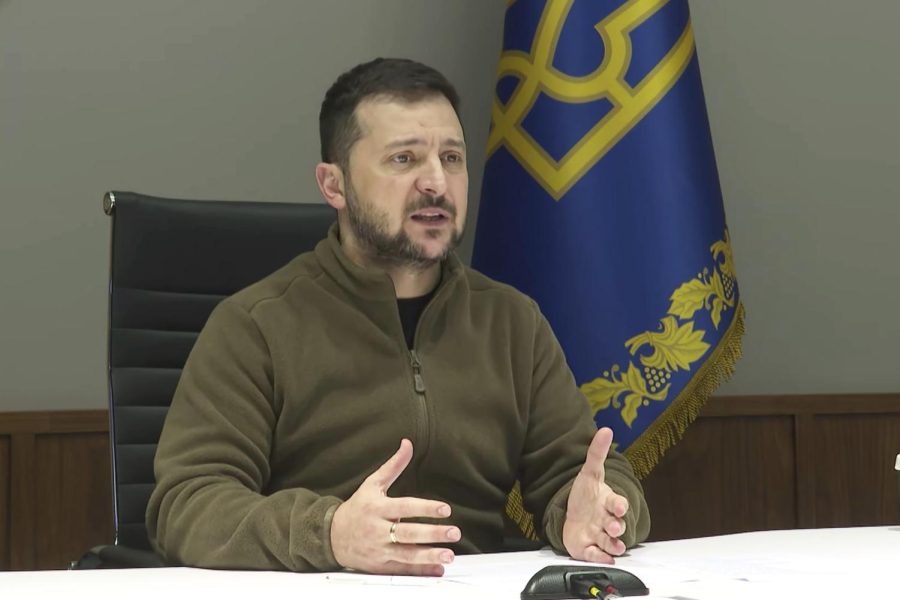Ukraine applied for NATO. What now?
(Ukrainian Presidential Press Office via AP)
Ukrainian President Volodymyr Zelenskyy speaks during the video conference of the leaders of the Group of Seven and Ukraine, in Kyiv, Ukraine. Zelenskyy has applied for Ukrainian admittance into NATO in respond to the Russian invasion.
Oct 14, 2022
On Sept. 30, following seven months of continuous conflict from Russia’s eastward expansion, President Volodymyr Zelensky submitted Ukraine’s “accelerated ascension” application for membership in the North Atlantic Treaty Organization (NATO). Just hours earlier, Russian President Vladimir Putin, announced that he planned to annex four separate Ukrainian regions, mimicking his previous move with Crimea in 2014. Zelensky stated that the fate of Ukraine and democracy as a whole is in the balance with this decision.
This journey was long and stressful for Zelensky, with the president even stating in March that the current war could prevent his country from ever joining the organization, a hope Ukraine has had for over a decade. This dates back to the 2008 Bucharest Summit when Ukraine originally requested a membership action plan. A consensus between all members was never reached, but the door for NATO entry was left ajar.
However, with a focus on combating Russian aggression, it is unknown if all 30 member states will risk causing further controversy by accepting Ukraine in the heat of combat.
One huge factor in this is Hungary. The nationalist Prime Minister, Viktor Orban, has previously been a vocal detractor of Ukraine’s NATO hopes. In the past, Orban openly discussed how he is in opposition to the mass migration of refugees, especially the recent influx caused by the Russia-Ukraine conflict.
Hungary is also a staunch Russian ally. In July, Orban called for sanctions on Ukraine and a peace agreement with Putin. This not only reflects Hungary’s post-Soviet sympathies but also where its economic loyalties lie; Reuters reports that 85% of the Hungarian economy is reliant on Russian gas.
“Since 2018, Hungary has been blocking Ukraine from undertaking this first required step so the process has been and will continue to be blocked by both Hungary and Turkey,” Jen Ziemke, a political science professor at John Carroll, told The Carroll News. “All 30 existing NATO members must vote yes in their national parliaments for a new member to gain admission to NATO. I don’t think it is an accident that Hungary expresses reluctance or outright blocks NATO expansion in general. It should be noted that Orban’s government is increasingly repressive, far-right and anti-democratic. Some have even called Hungary ‘Russia’s Trojan Horse’ in the middle of the alliance and Europe.”
Other past quarrels include Orban’s disagreement with Ukraine’s 2017 Law on Education, which began to phase out the use of minority languages (i.e. Bulgarian, Greek and Hungarian) in schools.
“Everyone living in Ukraine must speak and learn in Ukrainian and all official proceedings and public life should be in that language,” Ziemke elaborated. “I’m honestly not sure if this is the real reason or [is an] excuse [or] a side note.”
However, one problem Ziemke says that is going unnoticed is what she describes as the “Kurdish question.” Hungary, along with its close ally Turkey, previously stalled Finland and Sweden’s admission process into NATO because of their past Kurdish sympathies, a group that “would like to carve their own state out of what is now within the borders of Iraq, Iran and Turkey.”
“Of course, this goes against Turkey’s wishes and interests, because no state likes to lose a part of their territory or power,” Ziemke continued. “Why does this matter? Turkey and Hungary are best of friends, and Hungary will always side with the Turks on this issue. Despite reassurances from Hungary that the Hungarian Parliament would eventually come to ratify NATO admission for both Sweden and Finland, so far, as of the time of this writing, these proceedings have been delayed because both want to use their complaint against the Kurds as leverage to get ‘the things they want’ in a kind of a trade.”
Hungary and Turkey will most likely deploy similar delay tactics for Ukraine’s application. However, other countries are hesitant to let the war-torn country join until Russia backs down. Yet, with possible bargaining regarding both the Kurds and weapon acquisition, Turkey may be more likely to budge.
“Turkey is using delay tactics with respect to admission for Finland and Sweden as leverage for acquiring US F-16’s, which is what Turkey really wants: a quid pro quo of ‘we will agree to Sweden and Finland’s admission if you let us purchase these,’” Ziemke stated. “Additionally, Ankara [capital of Turkey] strongly resents Sweden and Finland’s warmth toward its Kurdish population by, in Turkey’s words, ‘creating safe havens for terrorists’ (aka-Kurds). [Long story short,] it’s complex.”
Yet, NATO Secretary General Jens Stoltenberg said the door for membership still remains open. As of Oct. 3, nine countries in NATO have outwardly supported Ukraine’s admittance into the alliance, including Poland, Romania, Slovakia, the Czech Republic, Estonia, Latvia, Lithuania, Montenegro and North Macedonia. The United States has also shown its willingness to approve NATO’s admission.
That said, on Oct. 11, Orban claimed that past U.S. President Donald Trump is the only “hope for peace” in the Russia-Ukraine conflict. Both of these leaders have previously expressed sympathies for Putin and less favorable Ukrainian views. Depending on the U.S. midterm elections, the United States may fall back into a phase of post-Soviet praise. Orban has also blamed German Chancellor Olaf Scholz for not de-escalating the situation.
If Ukraine can turn the political tides, it would have dramatically increased protection from the Kremlin under NATO, prompting other member states to retaliate to Russia’s aggression. This could easily spiral into a global conflict with Putin, guaranteeing World War III if the alliance welcomes the struggling nation into its ranks.













